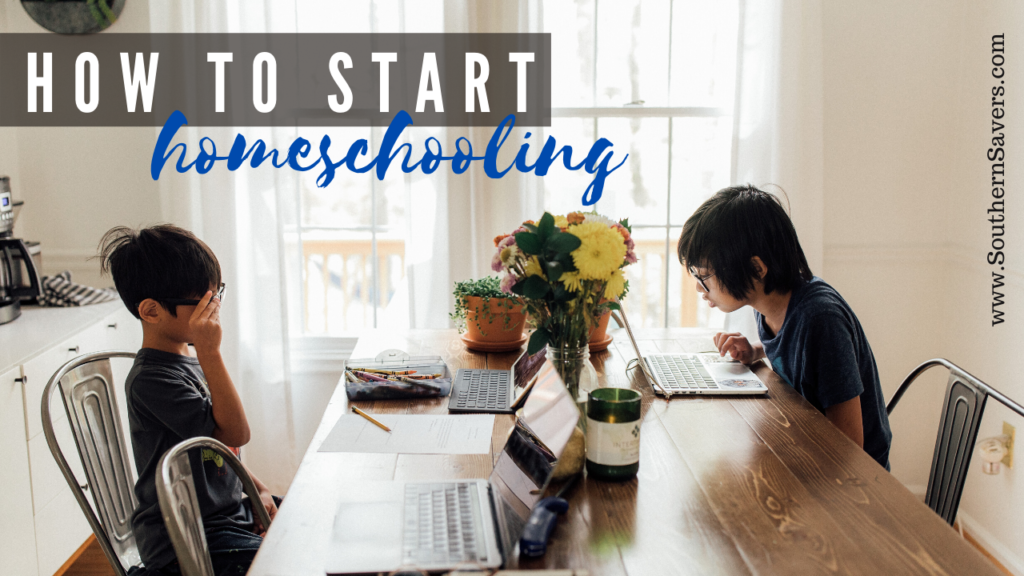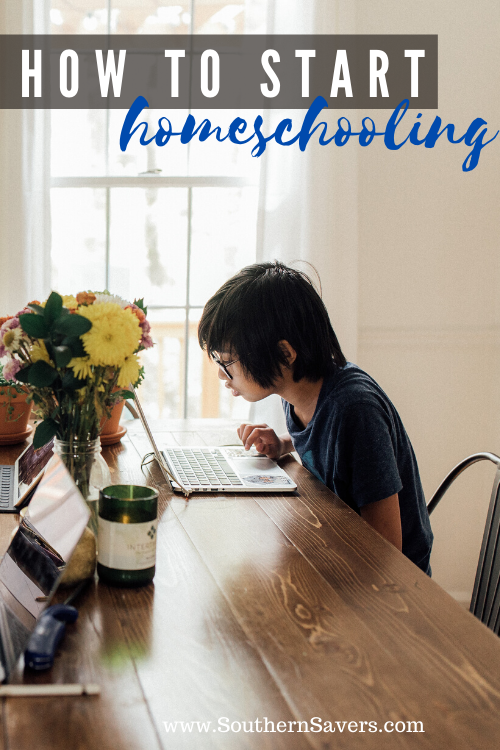This post may contain affiliate links. Read our disclosure here.

Because of all that has happened in the last 6 months, some parents are looking ahead to the fall and making changes to how they educate their kids.
While some parents are opting out of sending their kids to school and taking advantage of virtual learning options through their schools, other parents are choosing to start homeschooling. If you’re just now making this decision, it may feel overwhelming to get things in order before the fall. I wanted to share some helpful resources if you’ve decided to start homeschooling.
The flexibility of homeschooling is one of the best parts about it, so if you start a few weeks later than the kids going to regular school, it’s no big deal.
How to Start Homeschooling
While there are so many options when it comes to homeschooling, there are a few things you definitely need to do first.
Find out the laws in your state regarding homeschooling
The Homeschooling Legal Defense Association maintains a website where you can quickly see what kinds of things are required in your state. For example, some states require certain kinds of testing, while other states vary in guidelines for who is allowed to homeschool your kids.
You may need to complete the process of withdrawing your child from public school if they are already attending, so make sure you research that if it applies.
In some states, there are groups that offer accountability options. You may not be required to join one of these organizations, but it might be helpful if this is your first year as they can help guide you through the unfamiliar parts of how to start homeschooling your child(ren).

Look for homeschool co-ops and/or organizations and extracurriculars
Even if you don’t decide to join a homeschool accountability group, there are homeschool co-ops and organizations that provide opportunities for group activities, extracurriculars, and joint learning. Homeschool Classifieds or The Homeschool Mom are a great place to start.
Not only does this give your kids opportunities to make friends, but it can help cut the costs of these kinds of activities. For example, you can often do group music lessons at a reduced rate, which would not be possible if only your own children were involved.
Figure out your homeschooling style
If you are new to homeschooling, you may or may not know that there are many different methodologies as to how to educate your children at home. But you may not even know what your different choices are! One of the great things about homeschooling is that it’s very flexible. If you’re a type A personality, you can homeschool according to your personality. If you’re more laidback, there are also options to teach your kids. I found this homeschool style quiz matched up pretty well with the kind of homeschooling I prefer.

Decide what kind of curriculum you want to use and purchase it
Google will be your friend in this respect, because I can’t possibly cover all the homeschool curriculum options, but I found this post on how to choose a homeschool curriculum to be helpful if you’re just getting started. Remember especially if you’re starting with younger children (like kindergarten), you do NOT have to spend 7 hours a day teaching them everything under the sun. The best thing about homeschooling is that they can finish all their work in much less time than they would spend in a school setting, which means you have the rest of the day for them to learn through play and spend time doing other things!
Once you have purchased your curriculum and done whatever administrative things you need to do ahead of time, then you’re ready to get started!
Come up with a routine for your day
Once you’re ready to start officially homeschooling, you’re going to want some structure to your day. This doesn’t mean you have to come up with a minute by minute schedule, but having a routine will help both you and your kids. Life as Mom has a great post on creating a daily schedule.

Dedicate a space for homeschooling
You don’t have to have a special room just for homeschooling. If you have the space, great, but you can just as easily use the dining room table with a special shelf. Classically Homeschooling has some great small space homeschool ideas.
Look for other homeschoolers in your area
Meet people at the library or the park and see if you can connect in other ways. This doesn’t have to be an official group; you can just have fun with other homeschoolers who have the same kind of freedom and flexibility during the day. You might be able to find a Facebook group or connect through your church.

Figure out what metrics and information you need to track
Again, some of this will depend on what your state requires you to track. Some states do require you to track attendance, some want to see lesson plans, and some will want you to do testing or submit a portfolio. Even if they don’t require it, for your own benefit, it will be helpful to keep some kind of record of progress.
The Homeschool resource room has a great homeschool attendance record, and Rainbow Resource has lots of different options for lesson plan books. Not Consumed lays out how to create a homeschool portfolio.
Do you have any homeschooling tips to share? Let us know in the comments!



